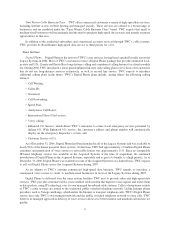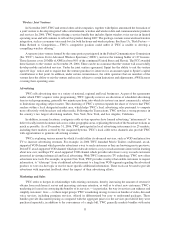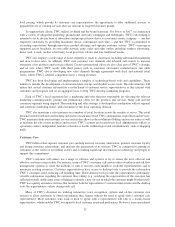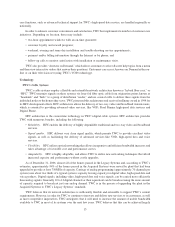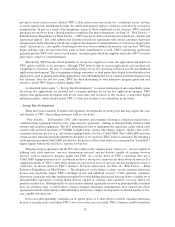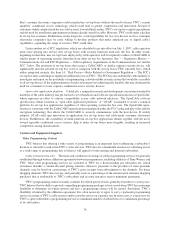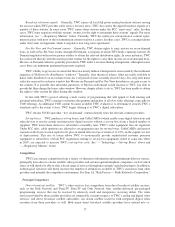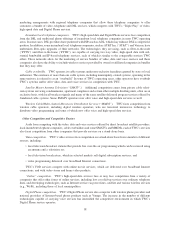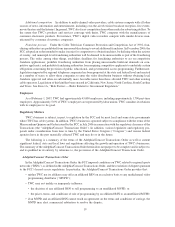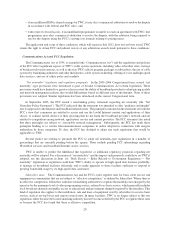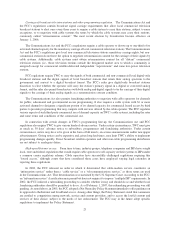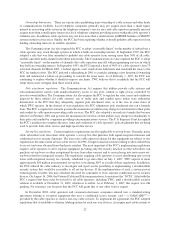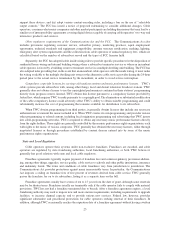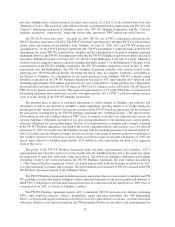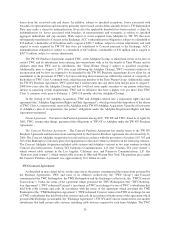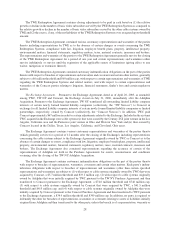Time Warner Cable 2006 Annual Report Download - page 24
Download and view the complete annual report
Please find page 24 of the 2006 Time Warner Cable annual report below. You can navigate through the pages in the report by either clicking on the pages listed below, or by using the keyword search tool below to find specific information within the annual report.Additional competition. In addition to multi-channel video providers, cable systems compete with all other
sources of news, information and entertainment, including over-the-air television broadcast reception, live events,
movie theaters and the Internet. In general, TWC also faces competition from other media for advertising dollars. To
the extent that TWC’s products and services converge with theirs, TWC competes with the manufacturers of
consumer electronics products. For instance, TWC’s digital video recorders compete with similar devices man-
ufactured by consumer electronics companies.
Franchise process. Under the Cable Television Consumer Protection and Competition Act of 1992, fran-
chising authorities are prohibited from unreasonably refusing to award additional franchises. In December 2006, the
FCC adopted an order intended to make it easier for competitors to obtain franchises, by defining when the actions
of county- and municipal-level franchising authorities will be deemed to be unreasonable as part of the franchising
process. The order, among other things, establishes deadlines for franchising authorities to act on competitive
franchise applications; prohibits franchising authorities from placing unreasonable build-out demands on com-
petitive applicants; and prohibits franchising authorities from requiring competitive applicants to undertake certain
obligations concerning the provision of public, educational, and governmental access programming. Furthermore,
legislation supported by regional telephone companies has been proposed at the state and federal level and enacted
in a number of states to allow these companies to enter the video distribution business without obtaining local
franchise approval and often on substantially more favorable terms than those afforded TWC and other existing
cable operators. Legislation of this kind has been enacted in California, New Jersey, North Carolina, South Carolina
and Texas. See Item 1A, “Risk Factors — Risks Related to Government Regulation.”
Employees
As of February 1, 2007, TWC had approximately 43,000 employees, including approximately 1,700 part-time
employees. Approximately 5.0% of TWC’s employees are represented by labor unions. TWC considers its relations
with its employees to be good.
Regulatory Matters
TWC’s business is subject, in part, to regulation by the FCC and by most local and some state governments
where TWC has cable systems. In addition, TWC’s business is operated subject to compliance with the terms of the
Memorandum Opinion and Order issued by the FCC in July 2006 in connection with the regulatory clearance of the
Transactions (the “Adelphia/Comcast Transactions Order”). In addition, various legislative and regulatory pro-
posals under consideration from time to time by the United States Congress (“Congress”) and various federal
agencies have in the past materially affected TWC and may do so in the future.
The following is a summary of the terms of the Adelphia/Comcast Transactions Order as well as current
significant federal, state and local laws and regulations affecting the growth and operation of TWC’s businesses.
The summary of the Adelphia/Comcast Transactions Order herein does not purport to be complete and is subject to,
and is qualified in its entirety by reference to, the provisions of the Adelphia/Comcast Transactions Order.
Adelphia/Comcast Transactions Order
In the Adelphia/Comcast Transactions Order, the FCC imposed conditions on TWC related to regional sports
networks (“RSNs”), as defined in the Adelphia/Comcast Transactions Order, and the resolution of disputes pursuant
to the FCC’s leased access regulations. In particular, the Adelphia/Comcast Transactions Order provides that:
• neither TWC nor its affiliates may offer an affiliated RSN on an exclusive basis to any multichannel video
programming distributor (“MVPD”);
• TWC may not unduly or improperly influence:
• the decision of any affiliated RSN to sell programming to an unaffiliated MVPD; or
• the prices, terms, and conditions of sale of programming by an affiliated RSN to an unaffiliated MVPD;
• if an MVPD and an affiliated RSN cannot reach an agreement on the terms and conditions of carriage, the
MVPD may elect commercial arbitration to resolve the dispute;
19


